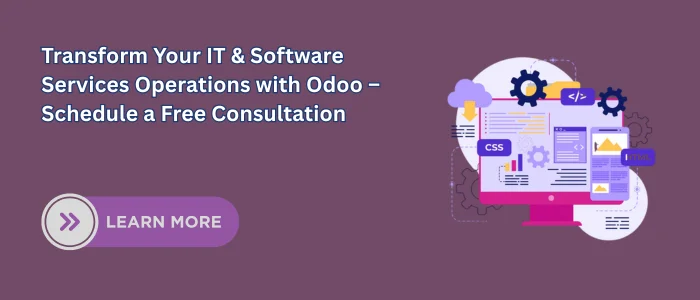Introduction
IT and software service companies often struggle with fragmented tools that slow project delivery, reduce visibility, and impact profitability. Odoo for IT & Software Services solves this by bringing project management, CRM, timesheets, support, and finance into one unified ERP platform, enabling real-time control and streamlined workflows. To maximize value and ensure a seamless implementation tailored to your business needs, consider partnering with an experienced Odoo development company like SDLC Corp, which can help you customize and optimize Odoo for growth and operational excellence.
1. Centralized Project Management for Agile IT & Software Teams
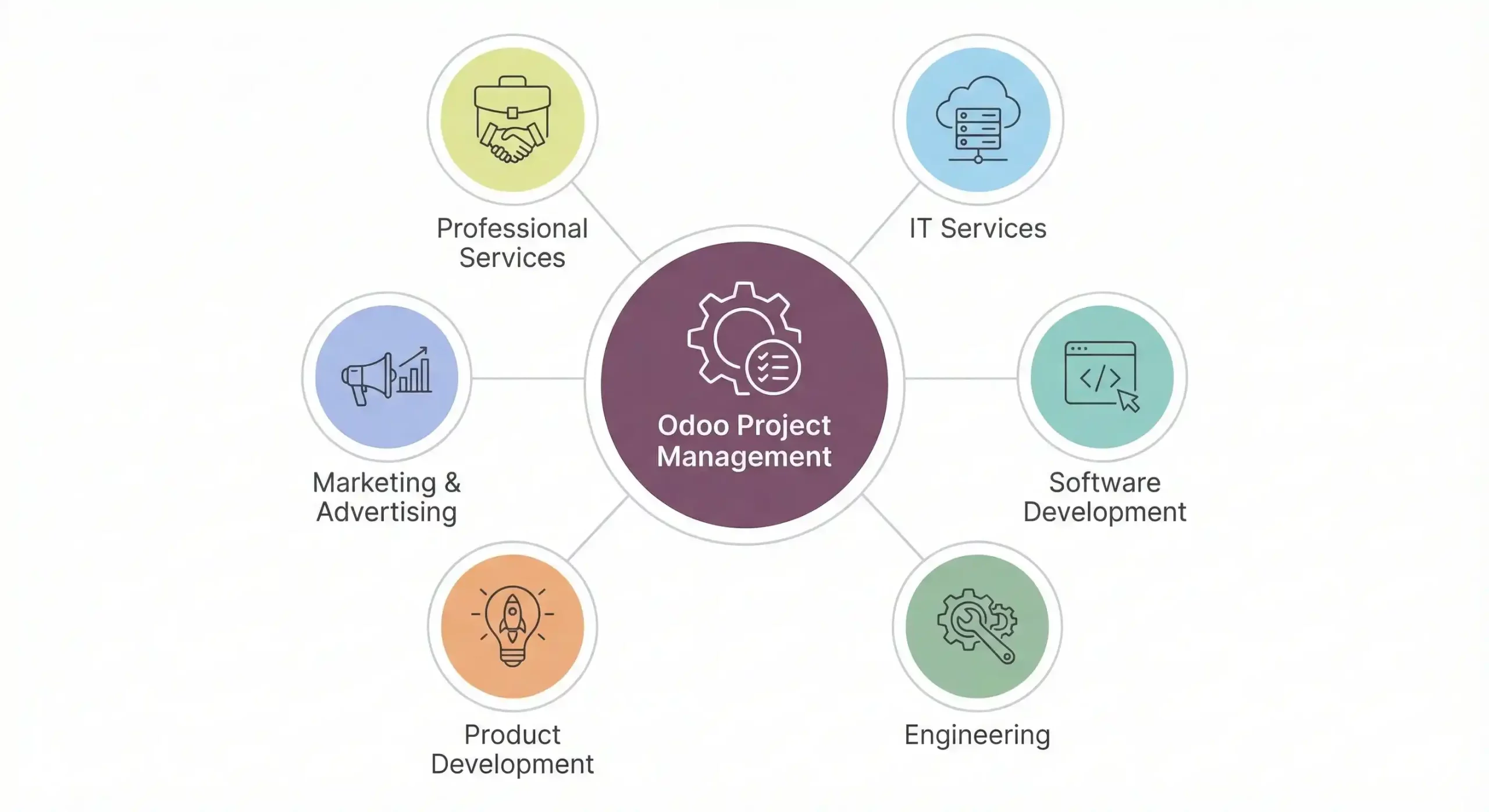
Managing Complex Projects in One Unified Workspace
IT and software service companies often manage multiple projects simultaneously, each with different timelines, teams, and client expectations. However, when project data is scattered across tools, tracking progress becomes difficult. Odoo for IT & Software Services solves this by offering a centralized project management system designed specifically for agile and service-driven environments.
Moreover, Odoo allows teams to manage all projects from a single workspace. Tasks, milestones, and deadlines remain visible in real time, which significantly reduces confusion and delays. As a result, project managers gain better control while teams stay aligned.
Flexible Views for Agile Execution
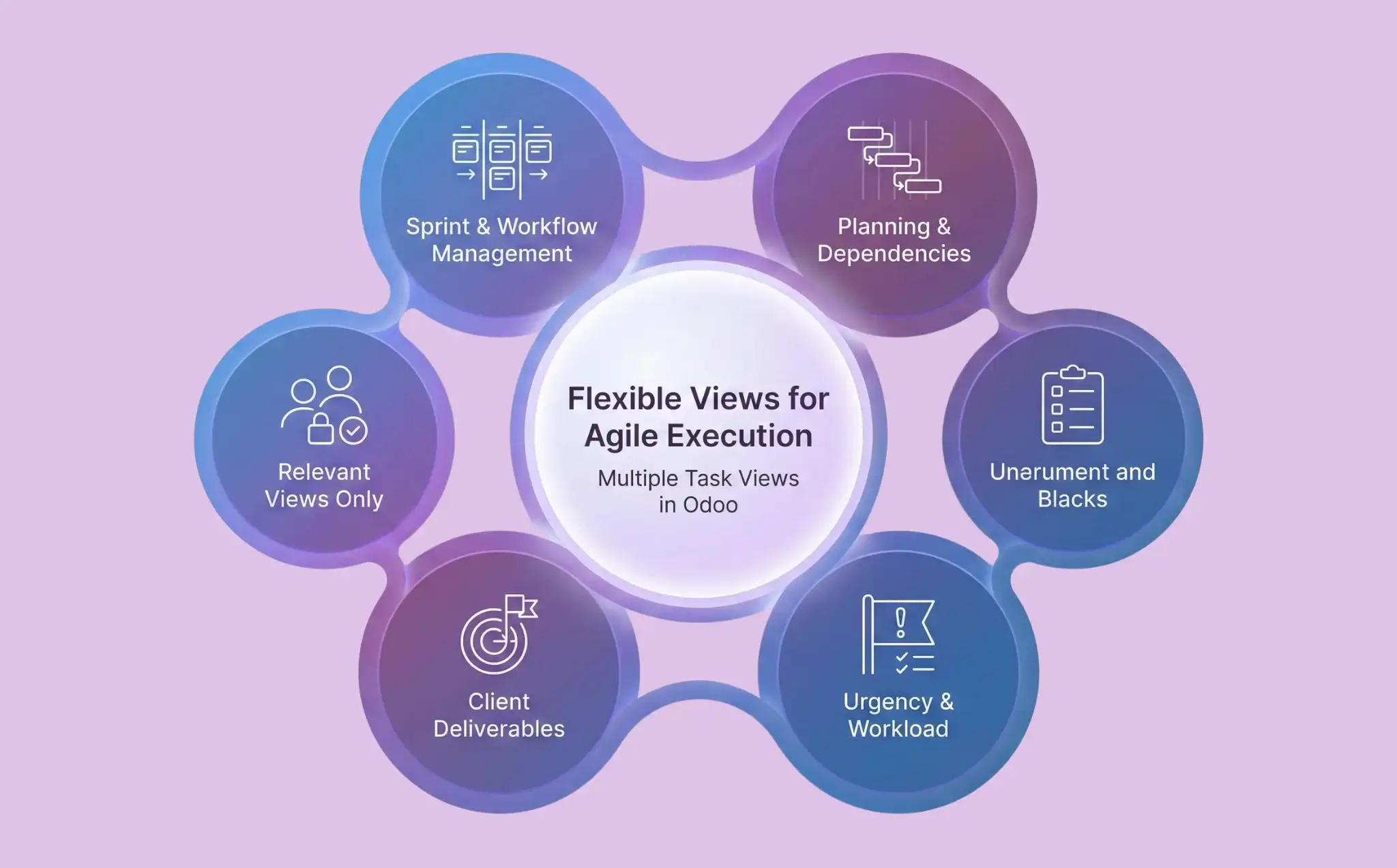
To support modern development methodologies, Odoo provides multiple task visualization options.
Key features include:
- Kanban boards for sprint and workflow management
- Gantt charts for timeline planning and dependency tracking
- Task prioritization based on urgency and workload
- Milestone tracking for client deliverables
Additionally, role-based access ensures developers, project managers, and stakeholders see only what is relevant to them. Therefore, collaboration improves without overwhelming teams.
Business Impact of Centralized Project Control
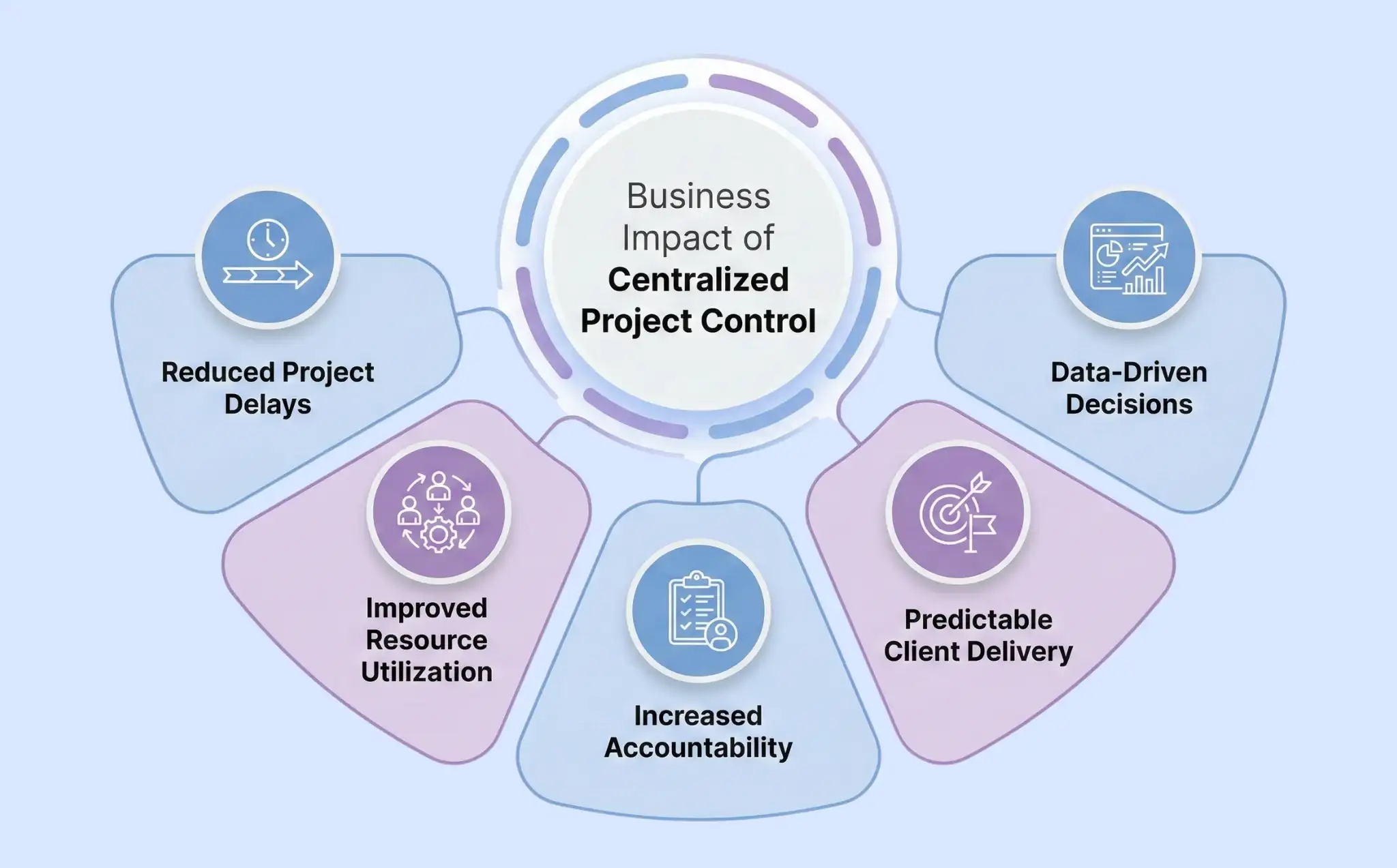
Because project execution is directly linked to productivity and revenue, having accurate visibility is critical.
As a result of using Odoo:
- Project delays are reduced
- Resource utilization improves
- Accountability increases across teams
- Client delivery becomes more predictable
Ultimately, Odoo transforms project management from a reactive process into a proactive, data-driven operation that supports faster delivery and sustainable growth.
2. Automated Timesheets & Accurate Billing for IT Services
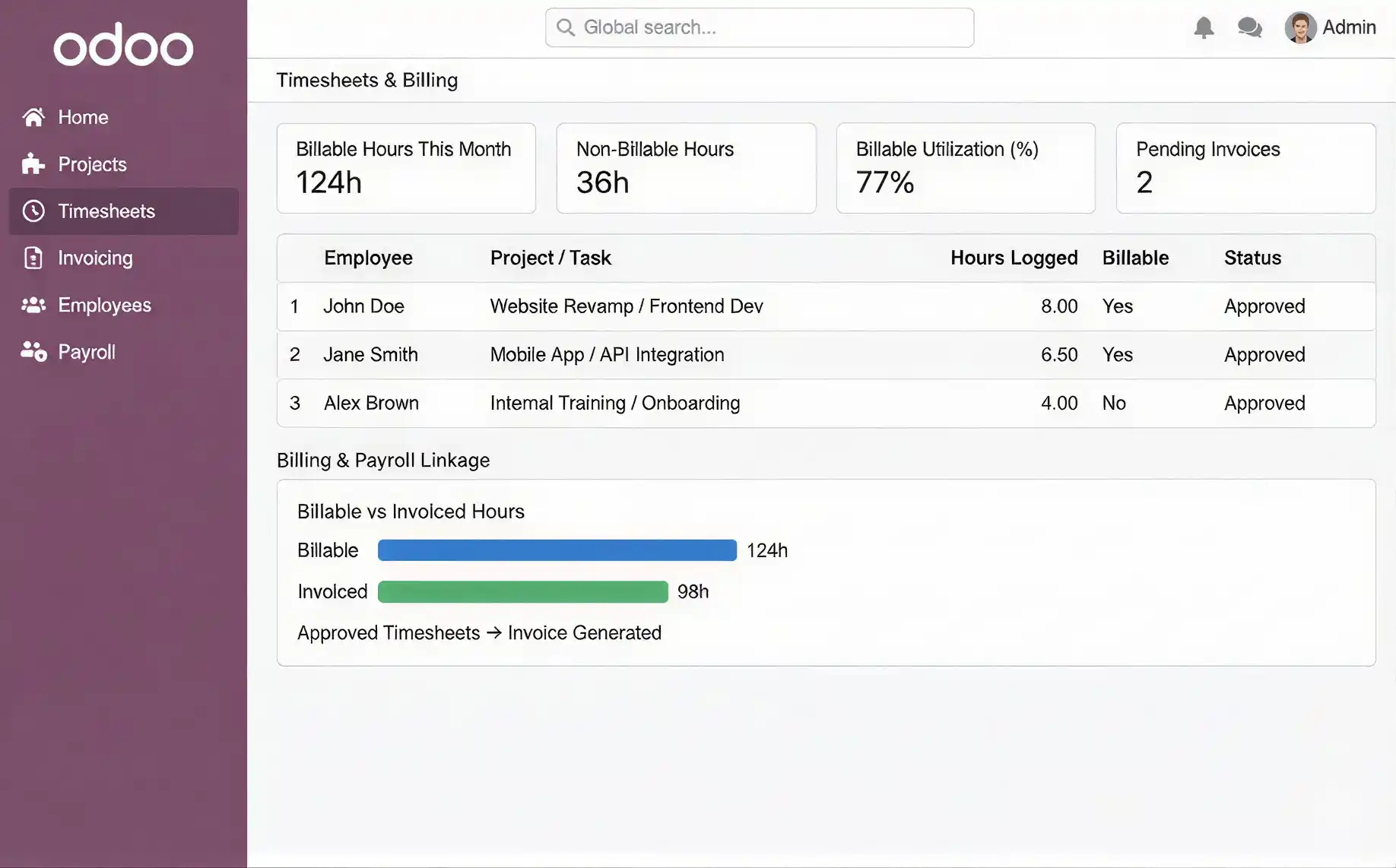
Eliminating Revenue Leakage with Smart Time Tracking
Accurate time tracking is essential for IT and software service companies, especially those working on hourly, milestone-based, or retainer contracts. However, manual timesheets often lead to missed billable hours and invoicing errors. Odoo for IT & Software Services addresses this challenge by automating timesheet management and linking it directly to projects and tasks.
Moreover, developers can log time directly within their assigned tasks. As a result, all billable and non-billable efforts are captured in real time. This not only improves accuracy but also reduces administrative overhead for managers.
Seamless Integration Between Timesheets, Billing & Payroll
One of Odoo’s key strengths is its seamless integration between timesheets, invoicing, and payroll.
Key capabilities include:
- Automatic conversion of approved timesheets into invoices
- Support for hourly, fixed-price, and retainer billing models
- Manager approval workflows for time entries
- Direct linkage between payroll and logged work hours
Additionally, finance teams gain instant visibility into billable utilization. Therefore, invoicing becomes faster, more accurate, and fully transparent.
Business Benefits of Automated Billing
Because billing accuracy directly impacts cash flow, automation delivers measurable results.
As a result of using Odoo:
- Revenue leakage is significantly reduced
- Invoice disputes decrease
- Cash collection cycles become shorter
- Project profitability becomes easier to track
Ultimately, Odoo ensures that every hour worked is accounted for, billed correctly, and reflected in financial performance.
3. CRM & Sales Pipeline Management for IT & Software Services
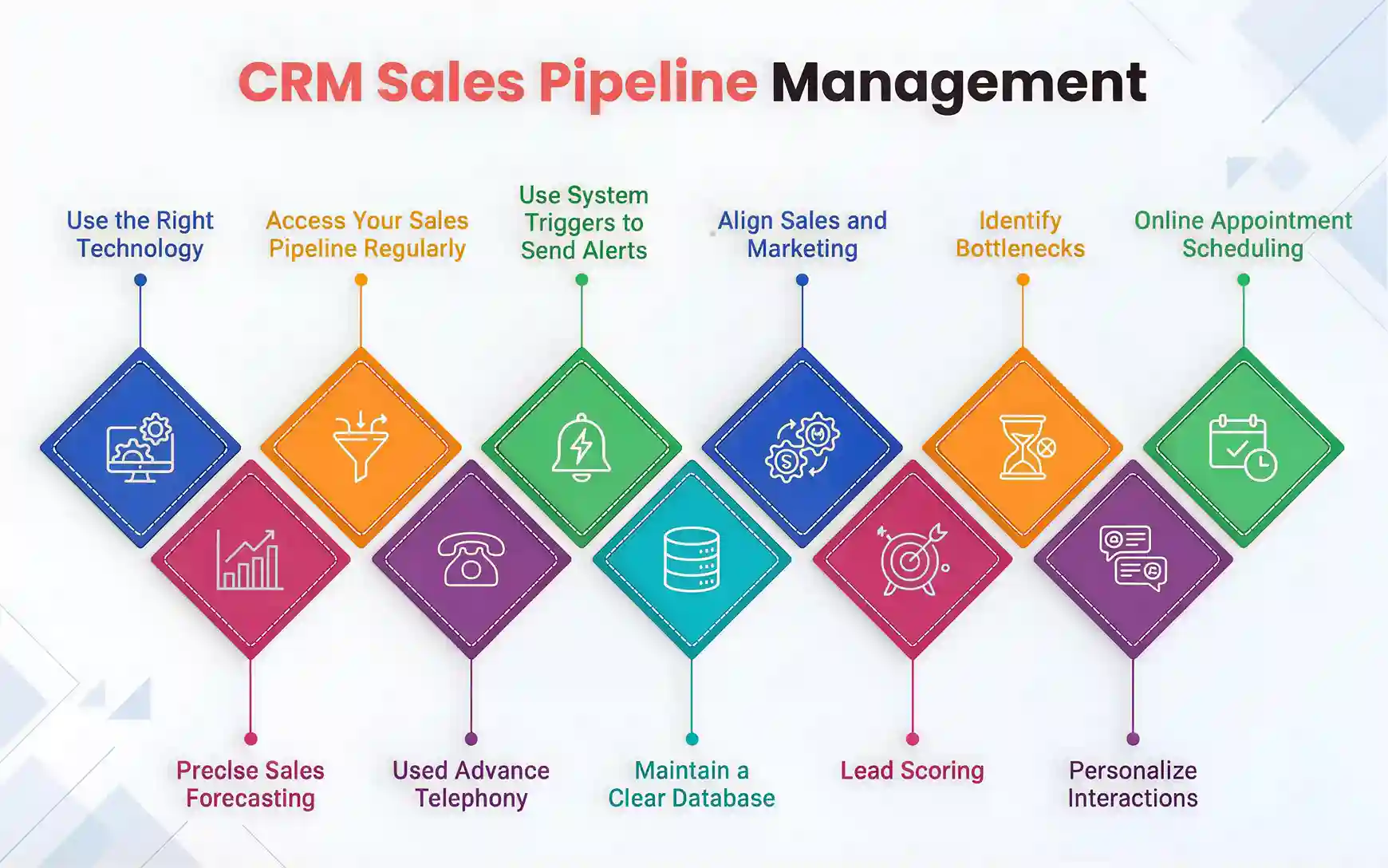
Turning Leads into Long-Term Client Relationships
For IT and software service companies, consistent revenue growth depends on an organized and transparent sales process. However, managing leads through emails or spreadsheets often results in missed opportunities. Odoo CRM solves this by centralizing the entire sales pipeline in one intelligent system.
Moreover, every lead, interaction, and proposal is tracked in real time. As a result, sales teams gain full visibility into deal status and client history. This structured approach ensures no opportunity is overlooked and follow-ups happen on time.
Streamlined Sales Workflows for Faster Conversions
Odoo simplifies complex sales cycles by automating routine sales activities and improving collaboration between sales and delivery teams.
‘;lkjhgf p
Key CRM capabilities include:
- Centralized lead and opportunity management
- Automated follow-ups and reminders
- Proposal and quotation generation
- Sales pipeline forecasting and reporting
Additionally, integration with project and accounting modules ensures a smooth transition from deal closure to project execution. Therefore, delivery teams can start work without delays or miscommunication.
Business Value of an Integrated CRM System
Because sales performance directly impacts business sustainability, having accurate insights is critical.
As a result of using Odoo CRM:
- Lead-to-conversion rates improve
- Sales forecasting becomes more reliable
- Client communication remains consistent
- Revenue pipelines stay predictable
Ultimately, Odoo helps IT and software service companies build stronger client relationships while driving sustainable and scalable growth.
4. Helpdesk & SLA Management for IT & Software Support Services
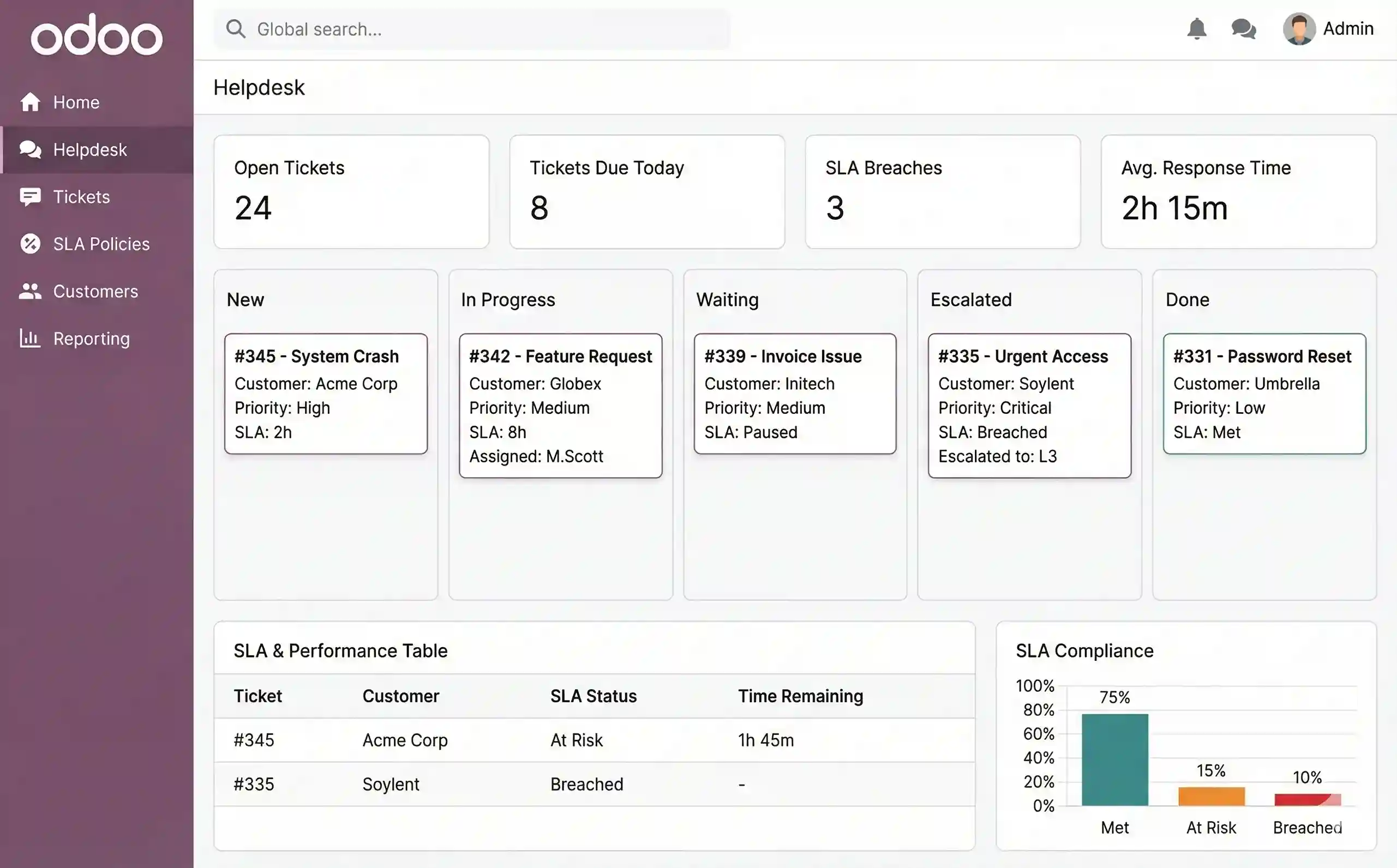
Structured Ticket Management for Faster Issue Resolution
IT and software service companies often manage ongoing client support alongside project delivery. However, without a centralized system, tracking issues and meeting service-level agreements (SLAs) becomes challenging. Odoo Helpdesk addresses this by providing a structured ticket management system that ensures every request is handled efficiently.
Moreover, all support tickets are captured in a single dashboard, making it easier for teams to prioritize and assign tasks. As a result, response times improve and no client request goes unnoticed.
SLA Tracking & Automated Escalations
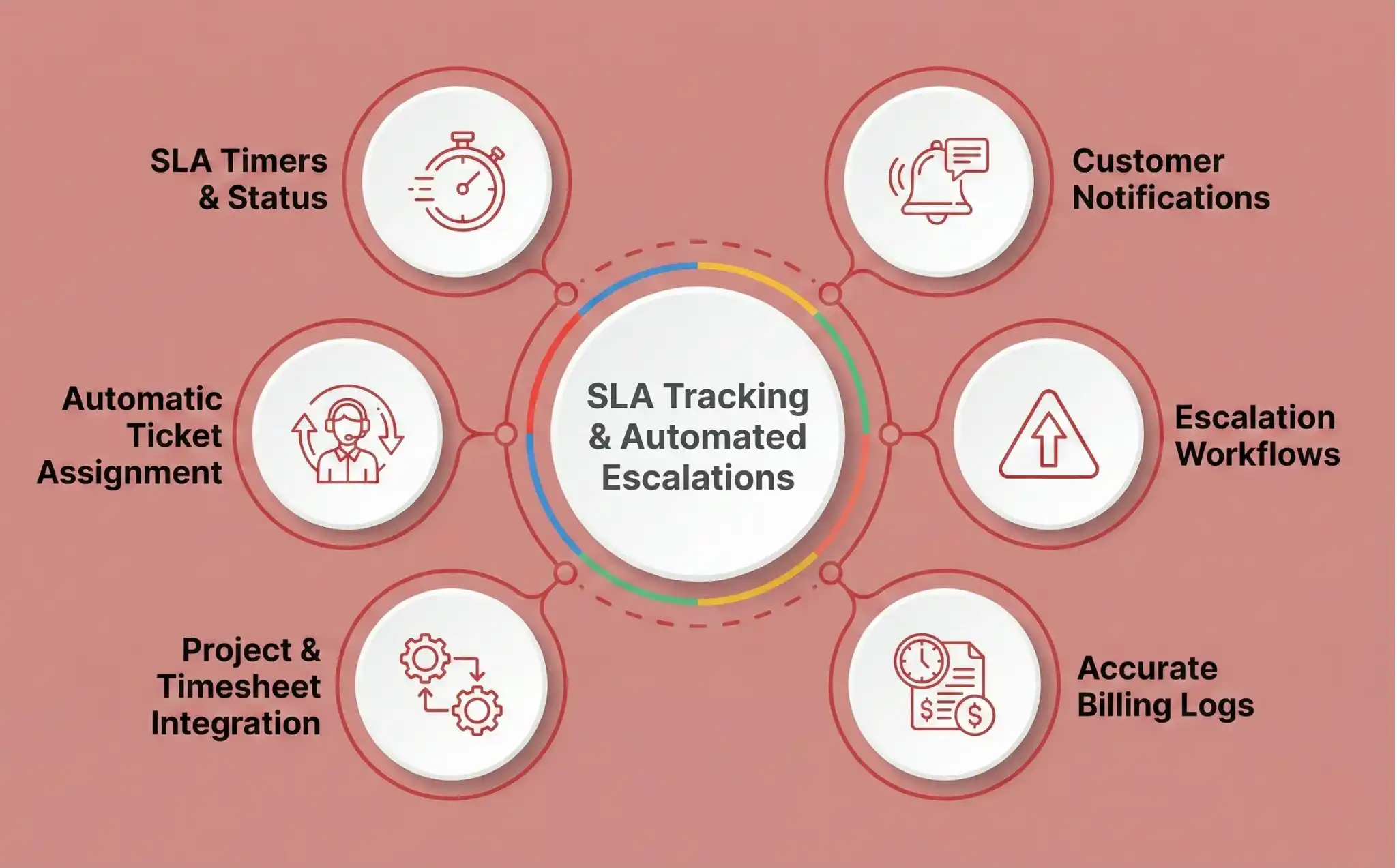
Meeting SLAs is critical for maintaining client trust. Odoo helps achieve this through built-in SLA tracking and escalation rules.
Key capabilities include:
- Automatic ticket assignment based on priority and expertise
- SLA timers with real-time status indicators
- Escalation workflows for overdue tickets
- Customer notifications and updates
Additionally, integration with project and timesheet modules allows support efforts to be logged and billed accurately when required. Therefore, both service quality and revenue tracking improve.
Business Benefits of Centralized Support Operations
Because support performance directly impacts client satisfaction, visibility and control are essential.
As a result of using Odoo Helpdesk:
- SLA compliance improves
- Issue resolution times decrease
- Support workloads become balanced
- Customer satisfaction scores increase
Ultimately, Odoo transforms support management into a proactive, transparent, and measurable service function.
5. Financial Management & Profitability Tracking for IT & Software Services
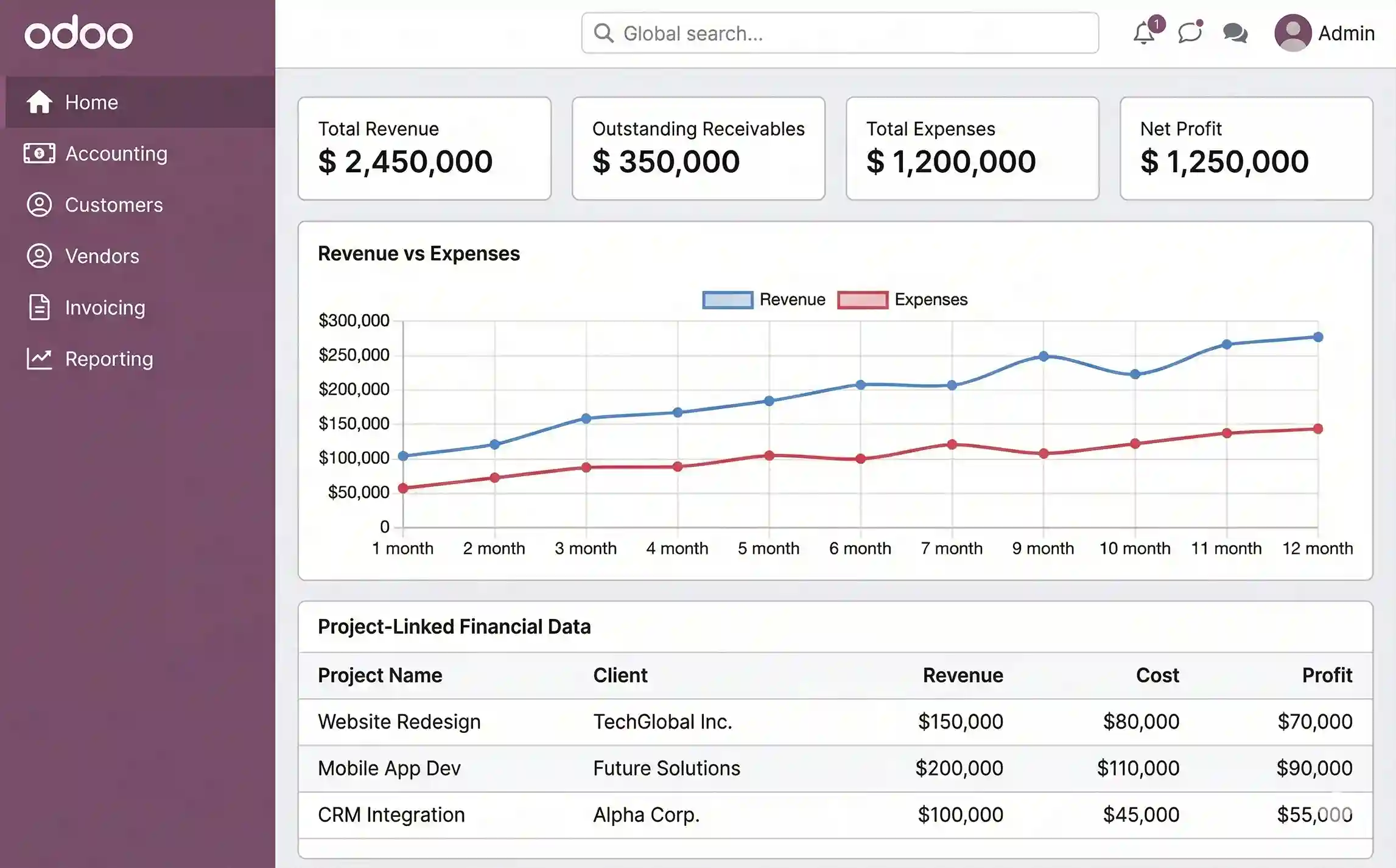
Gaining Real-Time Financial Visibility Across Projects
For IT and software service companies, controlling costs and maintaining healthy margins is critical. However, when financial data is spread across multiple systems, tracking profitability becomes difficult. Odoo Accounting solves this by centralizing all financial operations into one integrated platform.
Moreover, every invoice, expense, and payment is automatically linked to projects and clients. As a result, finance teams gain real-time visibility into cash flow and outstanding receivables. This transparency enables faster and more informed financial decisions.
Budget Control, Cost Tracking & Automated Accounting
Odoo simplifies financial management by automating routine accounting tasks while ensuring accuracy and compliance.
Key financial capabilities include:
- Automated invoicing and payment reconciliation
- Project-level cost and revenue tracking
- Budget vs. actual spend analysis
- Multi-currency and multi-company support
Additionally, integration with timesheets and procurement ensures that all costs are captured accurately. Therefore, businesses can prevent cost overruns and protect profit margins.
Business Benefits of Integrated Financial Management
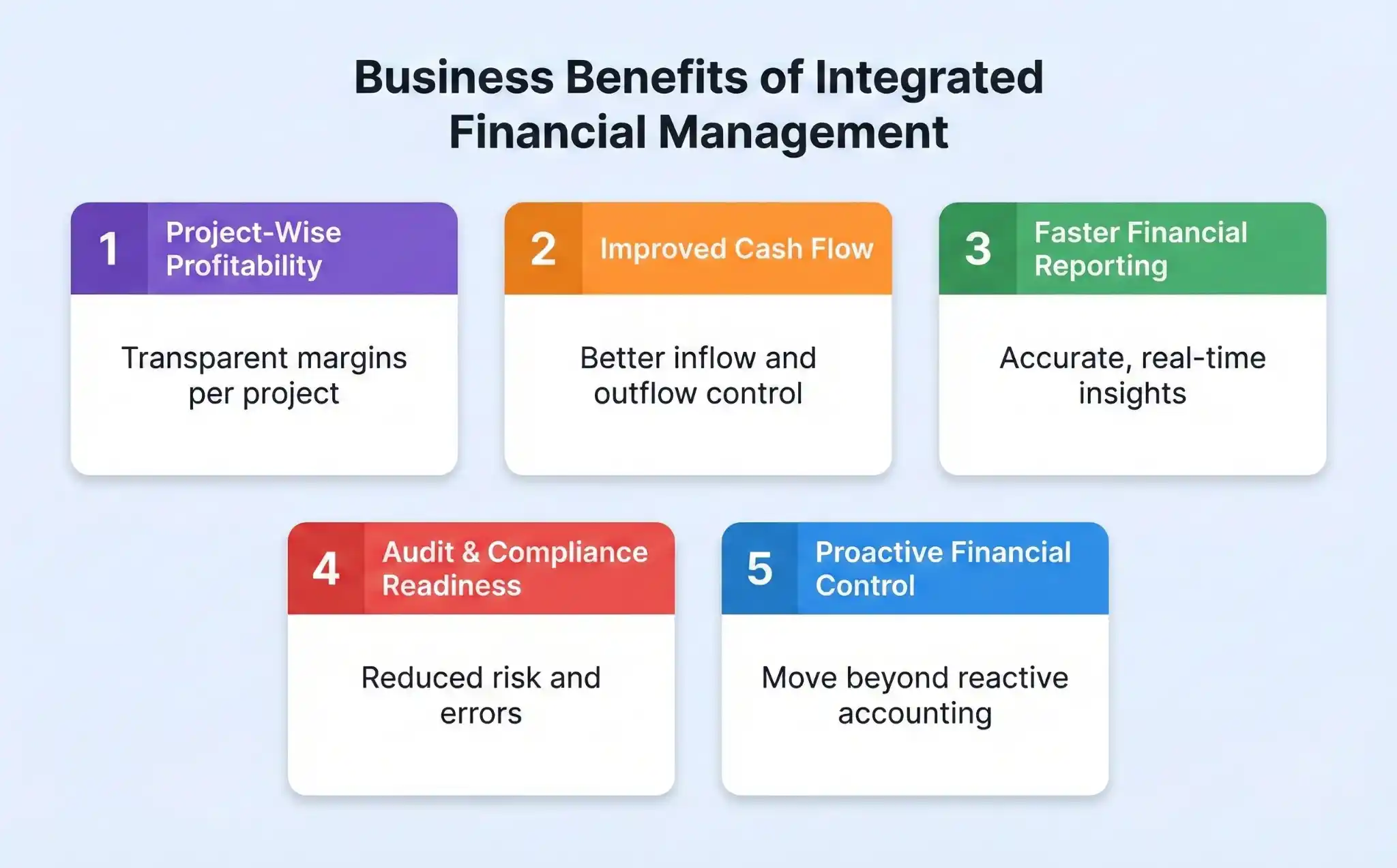
Because financial performance directly affects scalability, having reliable insights is essential.
As a result of using Odoo:
- Profitability per project becomes transparent
- Cash flow management improves
- Financial reporting becomes faster and more accurate
- Compliance and audit readiness increase
Ultimately, Odoo enables IT and software service companies to move from reactive accounting to proactive financial control.
6. HR, Recruitment & Resource Management for IT & Software Teams
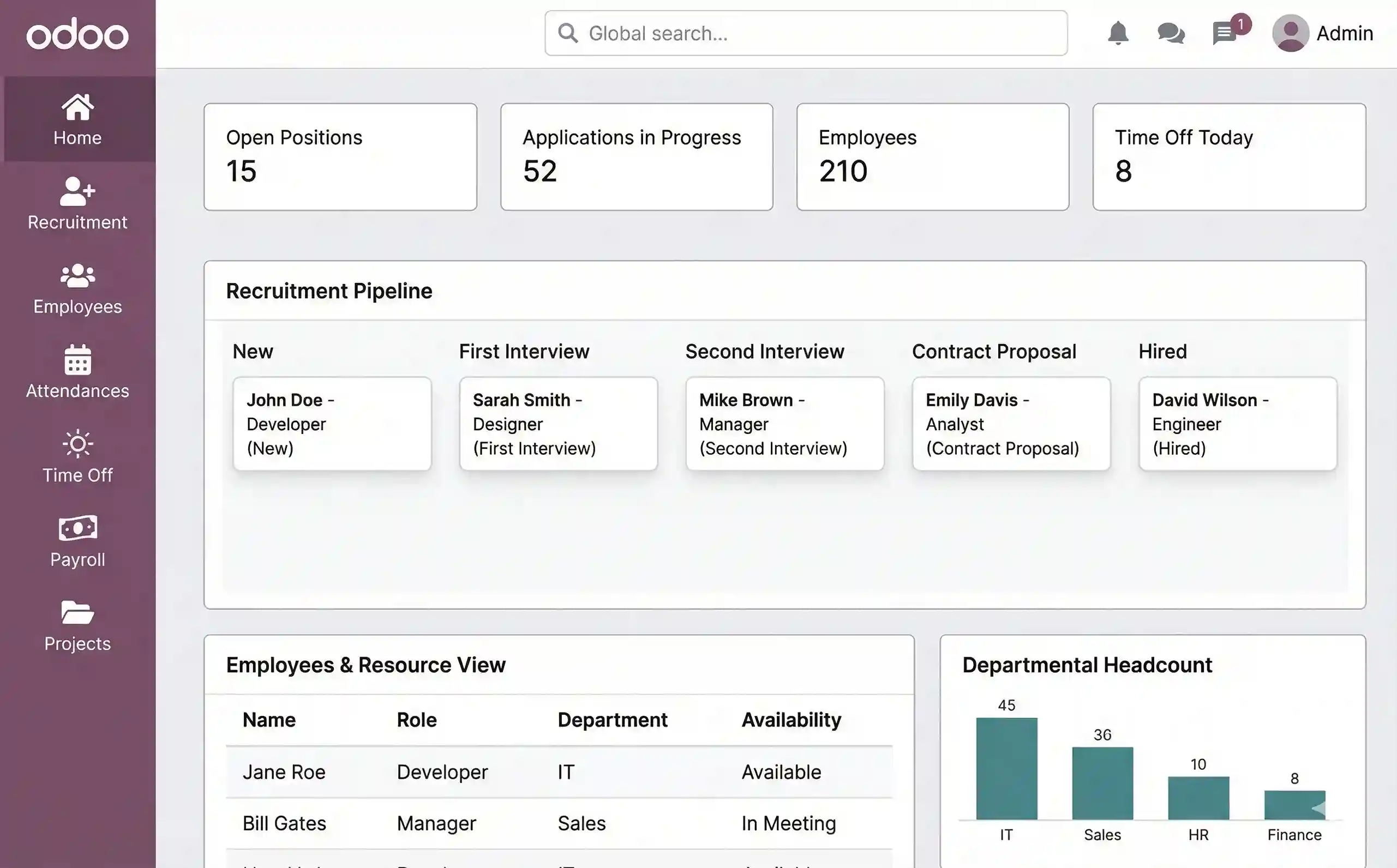
Streamlining Hiring and Onboarding for Growing Tech Companies
IT and software service companies rely heavily on skilled talent. However, managing recruitment, onboarding, and employee records through disconnected systems often slows growth. Odoo HR simplifies this by centralizing the entire employee lifecycle within one platform.
Moreover, recruitment pipelines allow HR teams to track candidates, schedule interviews, and manage hiring decisions efficiently. As a result, hiring cycles become shorter and more structured. Additionally, digital onboarding ensures new hires are productive from day one.
Workforce Management & Skill-Based Resource Allocation
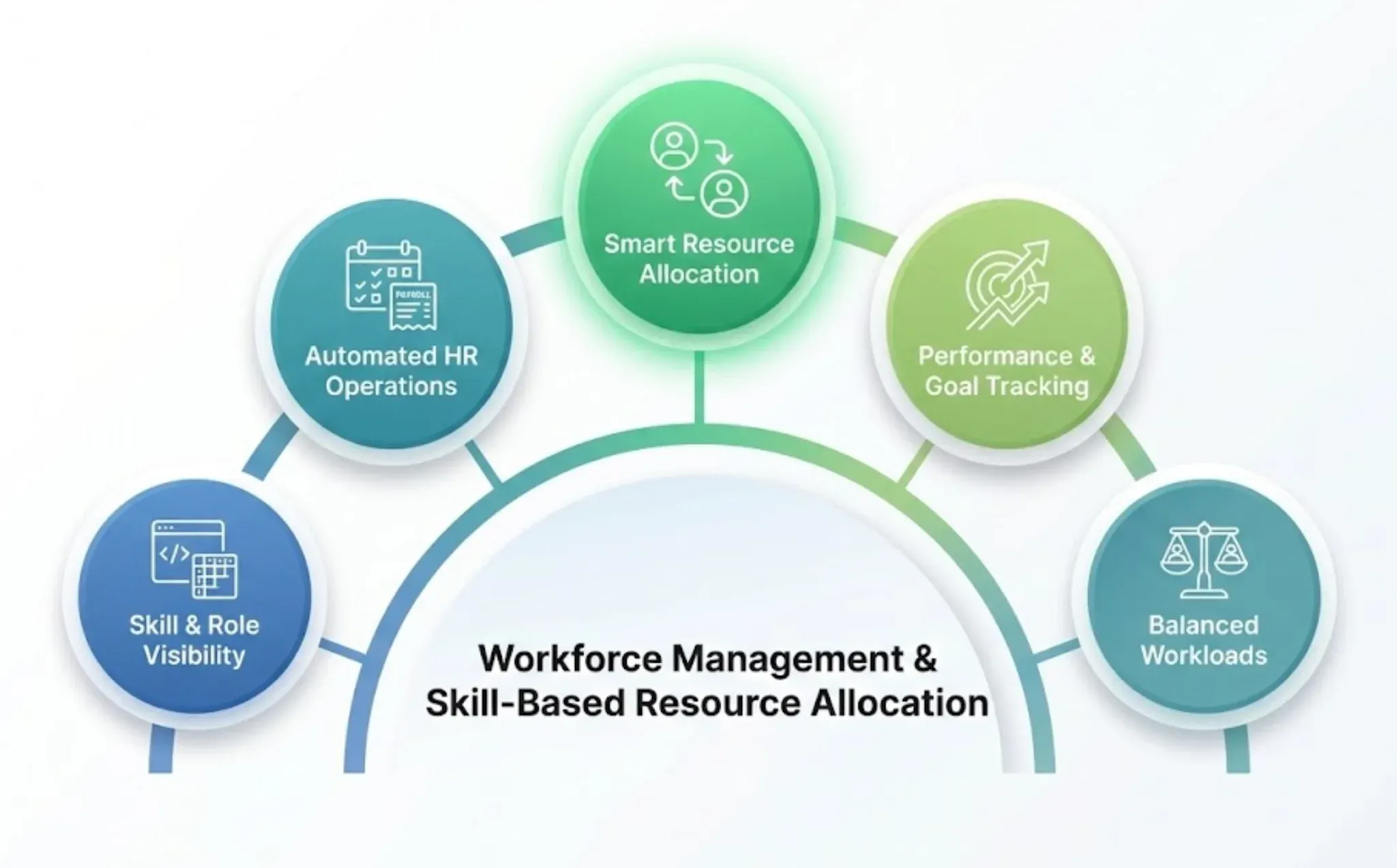
Odoo helps IT companies manage teams effectively by providing clear visibility into skills, availability, and workloads.
Key HR and resource management features include:
- Skill and role tracking for developers and consultants
- Automated attendance, leave, and payroll integration
- Resource allocation based on availability and expertise
- Performance reviews and goal tracking
Furthermore, integration with project modules allows managers to assign the right talent to the right tasks. Therefore, productivity improves while burnout risks are reduced.
Business Benefits of Centralized HR Management
Because people are the core asset of IT businesses, efficient HR management directly impacts performance.
As a result of using Odoo HR:
- Recruitment and onboarding become faster
- Workforce utilization improves
- Administrative HR tasks are reduced
- Employee engagement and retention increase
Ultimately, Odoo enables IT and software service companies to scale their teams efficiently while maintaining operational control.Additionally, efficient recruitment and onboarding are critical for scaling tech teams. Learn how organizations streamline hiring workflows by enhancing HR and recruitment efficiency using Odoo.
7. Odoo for IT & Software Services: Feature-to-Business Impact
The table below highlights how key Odoo modules directly solve common challenges faced by IT and software service companies. This structured comparison improves clarity for readers and supports faster decision-making.
| Odoo Capability | What It Does | Business Benefit |
|---|---|---|
| Project Management | Manages tasks, sprints, and milestones | Faster project delivery |
| Timesheets & Billing | Tracks time and automates invoicing | Accurate billing, higher revenue |
| CRM & Sales | Manages leads and pipelines | Improved client conversion |
| Helpdesk & SLAs | Handles support tickets efficiently | Better customer satisfaction |
| Accounting | Controls invoicing and expenses | Clear financial visibility |
| HR & Resource Planning | Manages hiring and team allocation | Optimized workforce usage |
Why This Table Works
This concise overview helps IT decision-makers quickly understand how Odoo for IT & Software Services aligns daily operations with business outcomes. As a result, readers can easily evaluate value without technical complexity.
8. Advanced Analytics & Real-Time Dashboards for IT Decision-Making
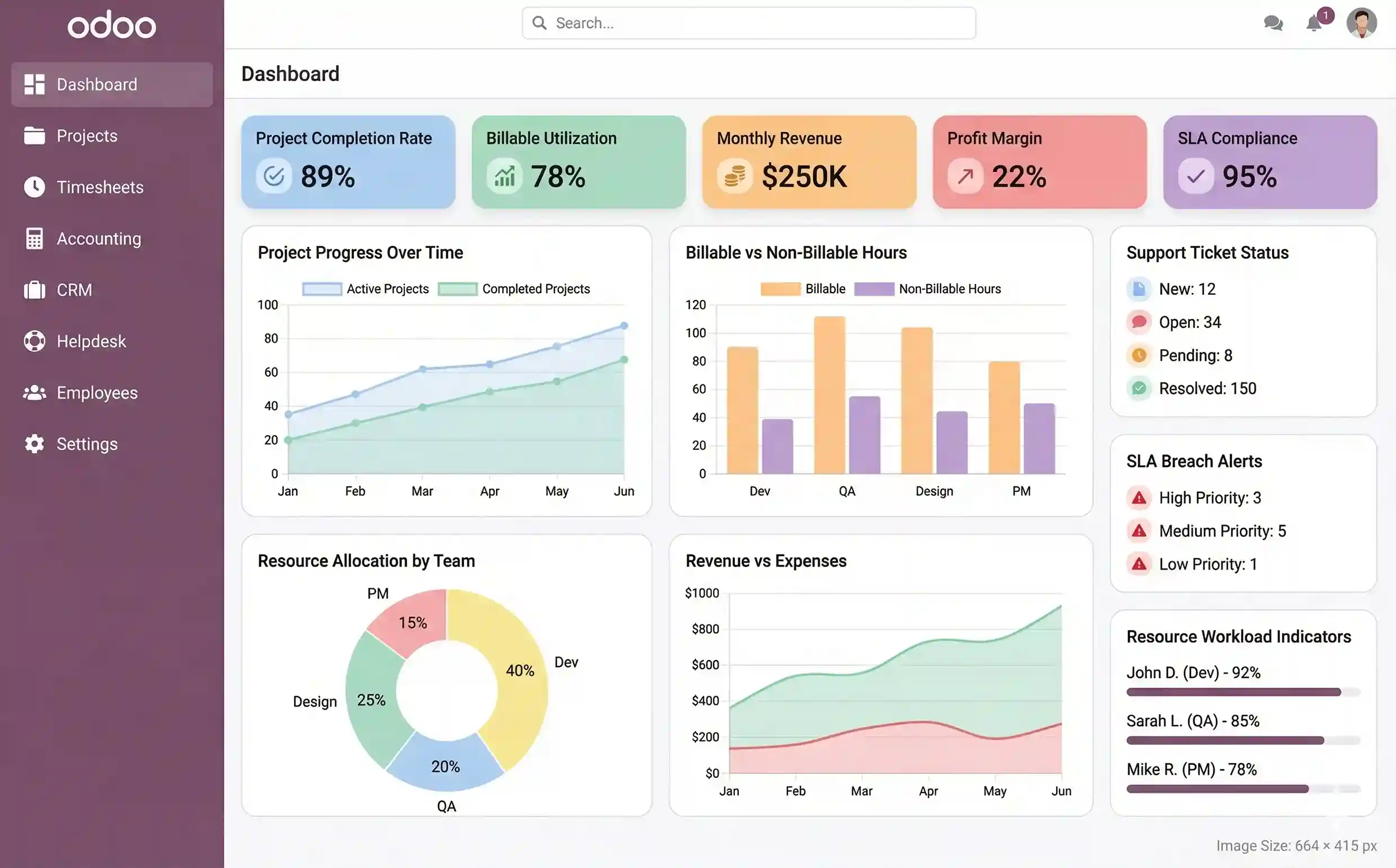
Turning Operational Data into Actionable Insights
IT and software service companies generate large volumes of project, financial, and workforce data every day. However, without clear visibility, this data remains underutilized. Odoo for IT & Software Services solves this by providing real-time dashboards that consolidate critical information into a single view.
Moreover, these dashboards update automatically as data changes. As a result, managers can monitor performance without relying on manual reports or delayed spreadsheets. This immediate access supports faster and more accurate decision-making.
Custom Dashboards for Projects, Finance & Resources
Odoo allows businesses to customize dashboards based on their operational priorities.
Key analytics features include:
- Project progress and delivery status
- Billable utilization and resource workload
- Revenue, expenses, and profit margins
- Support ticket performance and SLA trends
Additionally, role-based dashboards ensure that executives, managers, and team leads see only the data relevant to their responsibilities. Therefore, information remains focused and actionable.
Business Benefits of Real-Time Analytics
Because informed decisions drive business success, analytics plays a critical role in scaling IT services.
As a result of using Odoo analytics:
- Performance issues are identified early
- Project risks are reduced
- Financial forecasting becomes more accurate
- Operational efficiency improves
Ultimately, Odoo transforms raw data into meaningful insights that help IT and software service companies grow with confidence.Additionally, IT companies must maintain clear visibility into hardware, software licenses, and infrastructure assets to control costs and avoid compliance risks. For a deeper understanding of asset lifecycle tracking and optimization, explore how to manage assets effectively with Odoo ERP.
9. Scalability, Customization & Integration Flexibility with Odoo
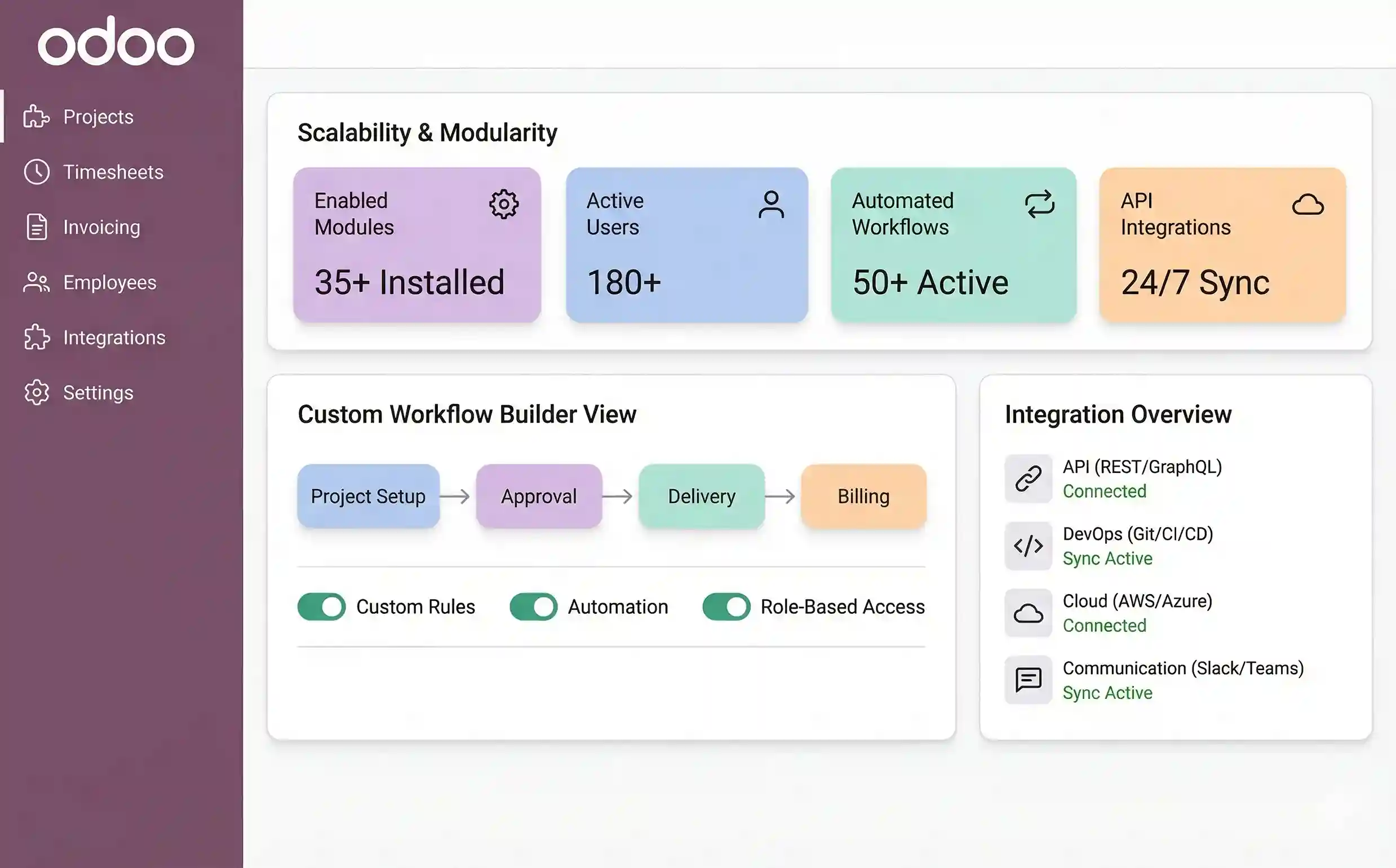
Built to Scale with Growing IT & Software Businesses
As IT and software service companies grow, their operational needs become more complex. However, rigid systems often limit scalability. Odoo for IT & Software Services overcomes this challenge through its modular and flexible architecture, allowing businesses to scale without disrupting existing workflows.
Moreover, Odoo’s flexible architecture supports industry-specific requirements across sectors such as IT services, manufacturing, and even complex verticals like automotive. To explore how Odoo adapts to large-scale operations, see how Odoo transforms automotive business processes.
Custom Workflows Tailored to IT Service Models
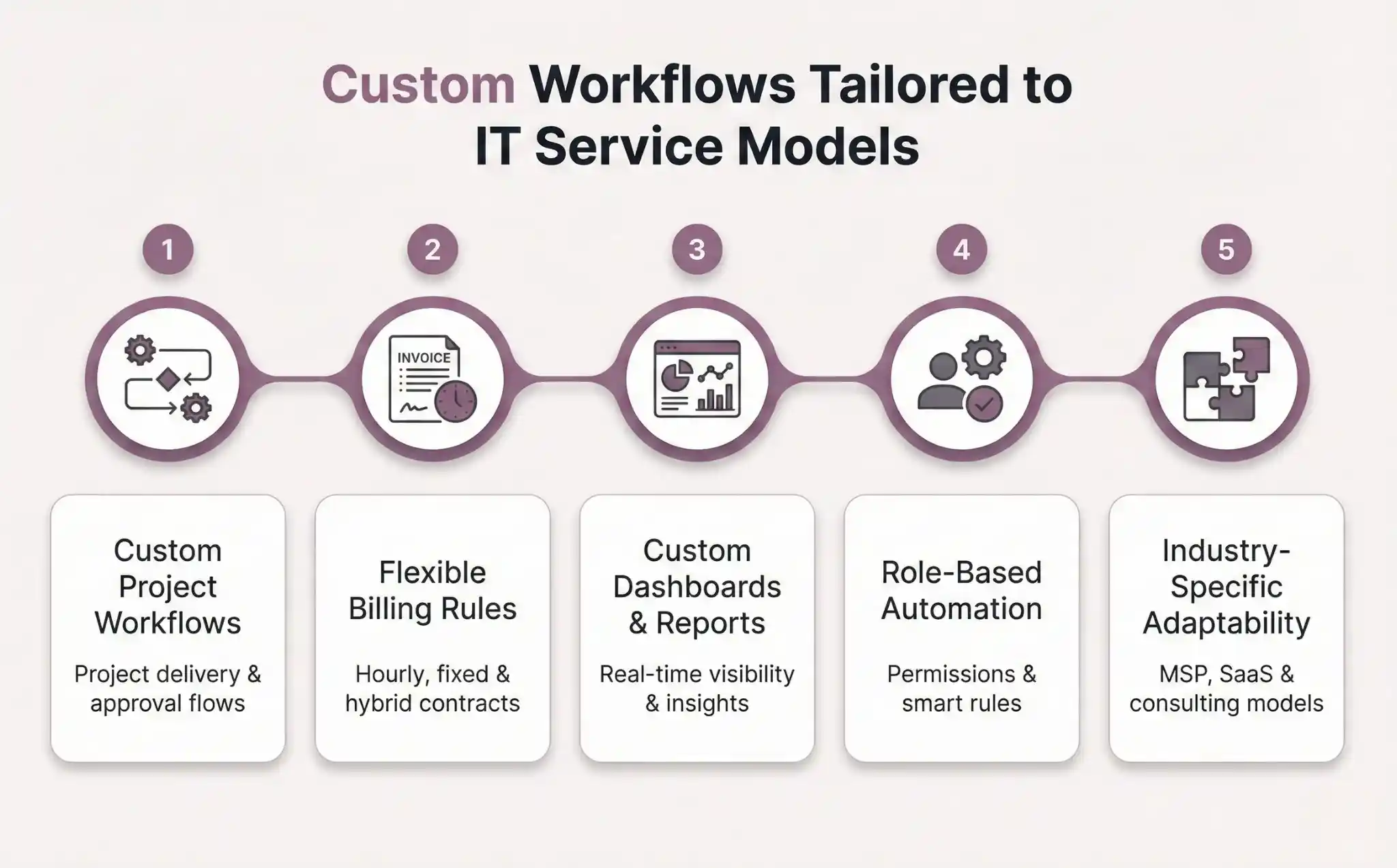
Every IT business operates differently. Therefore, Odoo offers extensive customization options to match specific service models and internal processes.
Key customization capabilities include:
- Custom workflows for project delivery and approvals
- Tailored billing rules for hourly, fixed, or hybrid contracts
- Custom dashboards and reports
- Role-based access and automation rules
Additionally, Odoo can be adapted to industry-specific needs such as managed services, SaaS development, or consulting operations. This flexibility ensures alignment with real-world business processes.
Seamless Integration with Existing Tools
Because IT teams rely on multiple platforms, integration is essential. Odoo connects easily with third-party tools such as DevOps systems, communication platforms, and cloud services.
As a result:
- Data flows smoothly across systems
- Manual data entry is reduced
- Operational efficiency improves
Ultimately, Odoo provides a future-ready ERP foundation that evolves alongside IT and software service businesses.
Conclusion
Odoo for IT & Software Services enables companies to manage projects, teams, clients, and finances through one unified ERP platform, improving efficiency and scalability. Moreover, with the right expertise, businesses can fully align Odoo with their service model. Partnering with experienced Odoo consulting services from SDLC Corp ensures smooth implementation, strategic optimization, and long-term success.
FAQs
What is Odoo ERP for IT & software services?
Odoo ERP is a unified platform that manages projects, CRM, timesheets, billing, HR, and support for IT and software service companies.
How does Odoo improve project management?
Odoo supports agile workflows with Kanban boards, milestones, and real-time task tracking, helping teams deliver projects on time.
Can Odoo automate billing for IT services?
Yes, Odoo links timesheets directly to invoicing, ensuring accurate billing and faster payments.
Is Odoo scalable for growing IT companies?
Yes, Odoo’s modular and customizable structure allows IT businesses to scale without system limitations.
How does Odoo support better decision-making?
Odoo provides real-time dashboards and reports that help managers make faster, data-driven decisions.
Why is SDLC Corp the best choice for Odoo development?
SDLC Corp is the best choice for Odoo development due to its years of hands-on experience, certified Odoo developers, and a proven track record of delivering industry-specific ERP solutions. With end-to-end capabilities—from consultation and customization to integration, migration, training, and long-term support—SDLC Corp ensures scalable, reliable, and ROI-focused Odoo implementations tailored to real business workflows.

